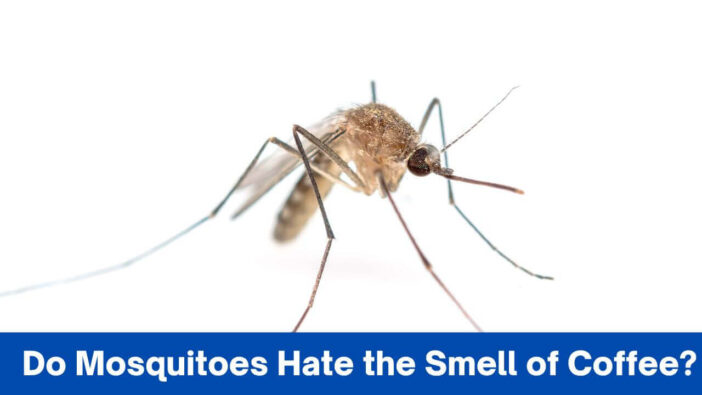
Monitoringclub.org | Do Mosquitoes Hate the Smell of Coffee? The annoyance of mosquito bites during summer nights has led to various creative remedies. One popular suggestion is that the smell of coffee can repel these pesky insects.
In this article, we delve into the science behind this claim, examining whether coffee’s aromatic allure is indeed effective in keeping mosquitoes at bay.
The Aroma That Intrigues and Baffles
The relationship between mosquitoes and scents is indeed complex. While certain scents can deter mosquitoes, the effectiveness of coffee’s aroma as a mosquito repellent remains a topic of debate.
Mosquitoes are sensitive to scents, and various odors can either attract or repel them. Some studies suggest that coffee grounds, when burned, can emit a strong aroma that might mask the scents that attract mosquitoes, thus potentially deterring their presence.
However, the effectiveness of this method varies, and relying solely on coffee grounds to repel mosquitoes might not provide comprehensive protection.
It’s important to note that while coffee’s scent might have some impact, it’s advisable to incorporate multiple mosquito control strategies. These could include using proven repellents, eliminating breeding grounds, and using physical barriers.
While coffee’s aroma might offer some level of mosquito deterrence, it’s not a foolproof solution. Understanding the intricate relationship between mosquitoes and scents can help individuals make informed decisions about their mosquito control efforts.
The Mosquito Sensory System: How Do They Detect Smells?
Mosquitoes possess a remarkable olfactory system that enables them to detect an extensive range of scents, even from a distance. Their acute sensitivity to odors plays a vital role in various aspects of their survival and behavior. When it comes to finding hosts for their blood meals, mosquitoes primarily rely on their sense of smell.
This olfactory prowess is facilitated by specialized receptors located in their antennae and other sensory organs. These receptors are finely tuned to detect specific volatile chemical compounds present in scents.
For instance, mosquitoes can sense carbon dioxide emitted by human breath, which helps them locate potential hosts. Additionally, they detect skin odors and body heat to further refine their search.
Mosquitoes’ keen olfactory abilities are not limited to finding hosts; they also play a pivotal role in locating nectar sources and identifying suitable oviposition sites. However, it’s important to note that the olfactory system is not solely responsible for their behaviors; other sensory cues and environmental factors also contribute.
Mosquitoes’ intricate olfactory system allows them to navigate their environment, locate hosts, and engage in essential behaviors for their survival. This sensory adaptation has enabled mosquitoes to thrive and persist as significant vectors of diseases.
The Coffee Aroma Myth: What Started the Buzz?
The genesis of the coffee aroma myth can be attributed to a combination of anecdotal claims and cultural beliefs. Over time, people have shared their experiences and observations of using coffee’s scent to repel mosquitoes, contributing to the spread of this idea.
Additionally, cultural narratives and traditional practices might have influenced the perception of coffee’s efficacy in mosquito control.
While some individuals fervently attest to the effectiveness of using coffee aroma to deter mosquitoes, skepticism persists among others who question the actual potency of this method.
Scientifically, the impact of coffee scent on mosquito behavior is a subject of ongoing research and discussion. While coffee does contain compounds with potential repellent properties, its reliability as a standalone mosquito control measure varies.
In essence, the coffee aroma myth finds its origins in personal experiences and cultural notions, but its scientific validity remains a point of contention in the field of mosquito control.
Decoding Coffee’s Aromatic Compounds: What Do Mosquitoes Think?
Coffee’s aromatic composition consists of a multitude of volatile compounds, each carrying a distinctive scent profile. The reaction of mosquitoes to these compounds is multifaceted, leading to the divergence in opinions regarding coffee’s repellent capabilities.
Scientific research suggests that certain aromatic compounds found in coffee might possess repellent properties for mosquitoes.
However, the effectiveness varies based on factors like concentration, exposure duration, and individual mosquito species. Some volatile phytochemicals in coffee have demonstrated the potential to repel mosquitoes, adding credence to anecdotal claims.
Despite this, the intricate interaction between coffee’s aroma and mosquito behavior is still not fully comprehended. Some studies propose that coffee waste or extracts might repel gravid mosquitoes.
While coffee’s aromatic compounds show promise as mosquito repellents, it’s important to acknowledge that the degree of efficacy is not uniform and may be influenced by various environmental and genetic factors.
Scientific Studies: Separating Fact from Fiction
Numerous scientific studies have delved into validating or debunking the coffee aroma myth’s effectiveness as a mosquito repellent. These studies employ diverse methodologies to explore the interaction between coffee’s aromatic compounds and mosquito behavior.
Some research indicates that certain volatile compounds found in coffee might have repellent properties against mosquitoes. However, the efficacy varies depending on factors like concentration, exposure duration, and mosquito species. While coffee waste or extracts may deter mosquitoes, the overall consensus remains divided.
The methodologies of these studies include assessing mosquito behavior in the presence of coffee compounds, conducting controlled experiments, and analyzing the chemical composition of coffee’s aroma.
Although there is promising evidence that coffee’s aromatic compounds can affect mosquito behavior, further investigation is needed to comprehensively determine their practical repellent potential.
The Truth About Coffee Candles and Repellent Sprays
Coffee-scented candles and repellent sprays are widely marketed as potential mosquito deterrents. While some anecdotal evidence suggests their efficacy, scientific support varies.
Research indicates that coffee grounds and their aroma can repel certain insects, including mosquitoes, due to their strong scent.
However, there’s limited concrete scientific evidence supporting the use of coffee candles or sprays as effective mosquito repellents. Some studies suggest coffee waste might deter certain mosquito species, but the outcomes can be inconsistent.
User experiences also vary. While some individuals report success with coffee candles or sprays, others might not find them as effective as dedicated mosquito repellents containing proven active ingredients.
Ultimately, the effectiveness of coffee-scented candles and repellent sprays as mosquito deterrents remains an area of ongoing study and personal experimentation.
Alternative Natural Mosquito Repellents: Aroma Edition
Beyond coffee, various natural scents have been suggested as mosquito repellents. Some options include:
- Citronella: A common and effective natural repellent derived from lemongrass.
- Lavender: Its fragrance and oil can help repel mosquitoes.
- Peppermint: Contains compounds that mosquitoes dislike.
- Lemon Eucalyptus: Contains PMD, a natural compound with proven repellent properties.
- Cinnamon: Its strong aroma may deter mosquitoes.
While these alternatives have repellent properties, their effectiveness can vary based on factors like concentration, application, and individual reactions. Scientific evidence supports their potential, but results may not be as robust as chemical repellents like DEET or picaridin. Combining multiple repellents might offer enhanced protection.
Frequently Asked Questions (FAQs) About Coffee and Mosquitoes
Can coffee grounds effectively repel mosquitoes?
Yes, coffee grounds can help repel mosquitoes due to their intense aroma that masks scents attracting mosquitoes. However, their effectiveness might vary.
How do coffee grounds repel mosquitoes?
Coffee grounds emit a scent that masks attractant odors, making it harder for mosquitoes to locate their targets.
What types of coffee are suitable for mosquito control?
Used coffee grounds from brewed coffee are commonly used. The type of coffee may not matter as much as its strong aroma.
Can coffee-scented candles or sprays work as mosquito repellents?
While such products exist, their effectiveness can vary. Scientific evidence supporting coffee-scented repellents is limited.
Are there more effective natural mosquito repellents than coffee?
Yes, alternatives like citronella, lavender, peppermint, and lemon eucalyptus have shown repellent properties.
Can coffee grounds eliminate mosquitoes?
Coffee grounds primarily repel mosquitoes; they don’t eliminate them.
Can I burn coffee grounds to repel mosquitoes?
Burning coffee grounds might help repel mosquitoes to some extent, but other methods are more effective.
Is coffee grounds’ mosquito repellent effect backed by scientific research?
Limited scientific evidence supports coffee grounds’ mosquito repellent properties, with more research needed for validation.
Are there potential downsides to using coffee grounds as a repellent?
Coffee grounds might attract pests like ants, and their effectiveness might vary based on factors like humidity and wind.
Can I use coffee grounds indoors for mosquito control?
Coffee grounds can be used indoors, but their aroma might become overwhelming.
Can coffee grounds replace chemical mosquito repellents?
While coffee grounds have some repellent properties, chemical repellents like DEET are more proven and reliable.
Can coffee grounds harm plants if used in the garden?
Used coffee grounds can be used as a soil amendment, but excessive use might affect soil pH.
Can I mix coffee with other natural repellents for better effect?
Combining coffee with other natural repellents might enhance the overall repellent effect.
Wrap It Up: Do Mosquitoes Hate the Smell of Coffee?
While there is anecdotal evidence suggesting that coffee’s scent can repel mosquitoes, scientific consensus is still elusive. Coffee grounds, when burned, emit a strong aroma that may mask the attractant scents for mosquitoes, potentially deterring their presence. However, the effectiveness of this method varies and might not provide comprehensive protection.
The intricate olfactory system of mosquitoes, their keen ability to detect scents, and the multifaceted nature of coffee’s aromatic compounds contribute to the complexity of the issue. While certain aromatic compounds in coffee might possess repellent properties, their efficacy is influenced by factors like concentration and mosquito species.
Overall, while coffee’s aroma might offer some level of mosquito deterrence, it’s advisable to incorporate multiple mosquito control strategies, including proven repellents, breeding ground elimination, and physical barriers, for more comprehensive protection against these pests.



